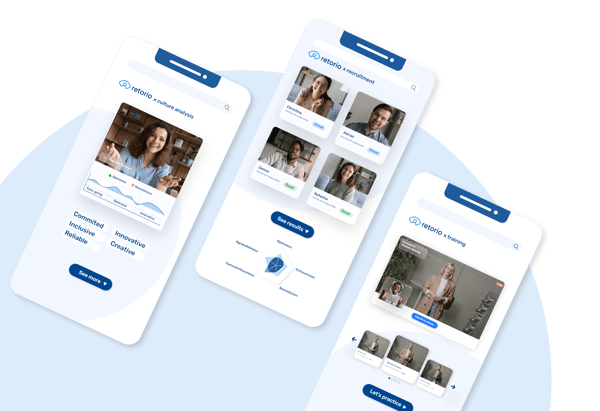Upskilling. Capability development. Reskilling.
They're the buzzwords that have been thrown around a lot over the last years as we come to terms with the growing pressure to adapt skill sets to new norms. The COVID-19 pandemic forced millions of companies globally to accelerate the development of new capabilities.
With such dramatic shifts to working norms, it's no wonder that companies frantically looked for new ways to upskill their people with unprecedented speed.
But it may not be as important as a lot of people think.
In a recent live webinar, Head of Marketing at Retorio, Aline Herth, spoke with Dr. Patrick Oehler, co-founder, and managing director at Retorio, to discuss “behavior change” and what lessons leading companies have learned on driving sustainable behavior change over the last years.
In this blog, we cover a few key questions that were brought to light.

What’s in this post?
- Why should companies forget about upskilling and reskilling their employees?
- Driving real behavior change is difficult. But why is this more important than simply upskilling?
- So how can workforces be trained to face these waves of disruptions in the future?
- Your job, as an organization, is to align your people with your culture. So how do you achieve that?
Let's start with the most burning question:
"Why should companies forget about upskilling and reskilling their employees?"
"We want to create awareness around the fact that upskilling may not in fact be as important as a lot of people think." - Dr. Patrick Oehler, co-founder and managing director of Retorio.
We all know smoking is bad for us, but that often isn't enough to change behavior. Send five smokers into a training session and tell them about how bad smoking is for their health, and provide them with all the knowledge and data there is to prove it. But is that really enough to make them all quit smoking for good? Will telling them they have an increased chance of developing cancer spark a real shift in their behavior?
When evolving an organization and improving its capabilities, affecting and changing employee behavior becomes the key challenge that companies need to focus on. Skills can be built comparatively easily, but changing and affecting behavior is the real challenge.
We can provide all the skills and knowledge to employees about what they should do better and why, but it may not be as effective when it comes to driving real change in behavior. But it isn't until Integrating yourself into people's lives and shaping the behavior of people.
"Driving real behavior change is difficult. But why is this more important than simply upskilling?"
Picture this... you're lying on a surfboard out in the ocean, hoping to catch a good wave. You have no idea what you're doing, and the next thing you know, you're getting dragged under the huge wave that you barely saw coming. You finally come up for air as the next wave rolls in, seconds before pulling you under again.
The volatile economic landscape we've been witnessing, especially over the last couple of years, closely resembles this wave. Just as we were coming up for air after the COVID-19 lockdown sanctions were slowly getting raised, and the invasion of Ukraine caused a massive humanitarian crisis and roiled markets. Meanwhile, we are dealing with another threat to lives and livelihoods all around the planet - climate change.
Inflation, supply chain issues, resource price inflation, looming recessions. Companies globally have felt the effects of the "waves of disruption" over the last few years. The bottom line is, companies need to learn how to not only deal with these changes and volatility but more so how to thrive in this volatility.
To implement the necessary technologies and adapt, companies believe it's all about closing skill gaps. 60% of U.S. companies believe this is what prevents them from effectively adapting to the volatile business environment.
But most companies fail at upskilling. 84% in fact.
Ask companies how they upskill their workforce, and chances are high they will have an elaborate competency matrix or a competency wheel or pyramid, or some kind of complex model that reflects the competencies and skills that they think the modern workforce needs. Then they take that and pour money into a program or e-learning course, hoping that that will lead to the skills they believe will be relevant in the future.
But the past few years have shown us that we don't necessarily know what skills are going to be necessary for the future. No one predicted that in a matter of months, the world would have to digitalize its business processes as the home office became the new norm.
"So how can workforces be trained to face these waves of disruptions in the future? "
"The real challenge is to create a culture of behaviors that embrace change and learning." - Dr. Patrick Oehler.
89% of failed transformation projects are due to misalignment of behavior and culture, and just 11% are due to skill gaps. Skills can be gained comparatively quickly. Through motivation and interest, employees can pick up skills and make up these skill gaps. But the real challenge lies in creating urgency and engagement and aligning the behavior of the employees with the culture.
"Your job, as an organization, is to align your people with your culture. So how do you achieve that?"
That's where Retorio's A.I. platform comes into play. "We tried to find ways to explain, predict and change behavior" explains Patrick. "We started developing algorithms that allow us to do exactly so through video analysis."
The best way to understand behavior is, inevitably, to interact with people. Through analyzing videos of real people, Retorio's A.I. quantifies behavior and personality and helps build conclusions on how people come across.
So how do companies use this technology?
The main reason companies started using this technology was to evolve their culture. To help their talent become more adaptable to change, to help them become more customer-centric.
The A.I. would identify winning behaviors within company cultures, then drive these winning behaviors and essentially make them scalable.
"Most of our clients are large. For them, it's really about understanding how certain people in their organization are so much better at adapting to change and evolving than others. The good thing is, most of our clients don't really know what skills they'll need in the future, but they have a good idea of which employees have the capabilities to take them there." Patrick explains.
"We invite those people to take part in simulations, record them on video, analyze them, and find out what traits make them so great at their job. We then transfer the rest of these insights to the rest of the team and enable them to behave in a similar way."

Want to start developing your training today, so that your teams are ready for what's to come tomorrow? Make the first step today, and prepare for the future. Adopt A.I. into your training plans and drive real change in your culture.
Click below to try out our A.I. and see what change you could drive in your culture.



